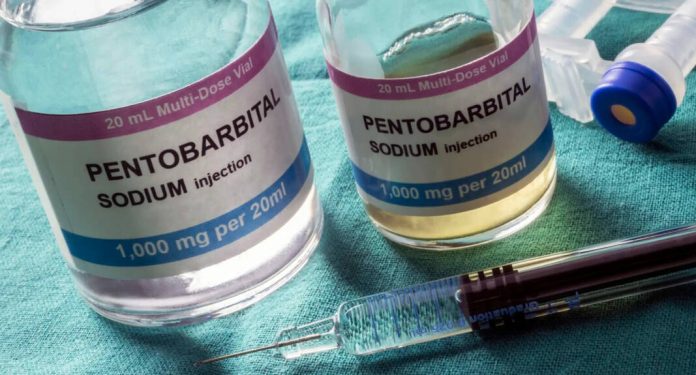The Indiana Department of Correction has refused to disclose how much the state paid to acquire a new execution drug, pentobarbital, that could be used to carry out at least one death warrant before the end of the year.
The agency officially denied the Indiana Capital Chronicle’s public record request Tuesday, citing a state law that makes information about the source of execution drugs confidential. Lawmakers made the code change on the last day of the 2017 legislative session but the statute does not mention cost.
In recent months, the law has been broadly applied by DOC and Gov. Eric Holcomb’s office to shield details about how the state obtained the drug. Asked numerous times about where the pentobarbital was acquired or how much it cost, Holcomb’s office has declined to comment, citing the same state law.
Questions about pentobarbital remain unanswered
The Capital Chronicle first requested information about the state’s acquisition of pentobarbital on June 30 after the governor, along with Indiana’s attorney general, announced that DOC has obtained pentobarbital to carry out the death penalty.
To comply with the statute, the Capital Chronicle suggested in its request that DOC redact all information about the drug except for cost.
After receiving no response from the DOC, the Capital Chronicle filed a formal complaint with the Indiana Public Access Counselor on Sept. 27.
Indiana’s long death penalty hiatus was the result of being unable to procure the necessary drugs. In a years-long lawsuit, the agency’s staff argued that without confidentiality for manufacturers and distributors, it was “practically impossible” to get the drugs.
Washington, D.C. lawyer Katherine Toomey asked for information related to lethal injections in 2014 under Indiana’s Access to Public Records Act. She filed suit in 2016 after being denied information.
Former Marion County Circuit Court Judge Sheryl Lynch wrote an order in Toomey’s favor in 2017. But behind the scenes, the Department of Correction was working with the governor’s office to devise a legislative solution.
On the last day of 2017’s legislative session, lawmakers inserted a provision exempting the identity of the source of the drug or information “reasonably calculated to lead to the identity of such a person.”
When the Indiana Supreme Court took it up, its four members — one recused himself — split, affirming Lynch’s decision in 2021.
In its Tuesday denial letter, the agency said it “has received and is processing more than a dozen” record requests since June “regarding our execution procedures and protocols, many of which contain multiple inquiries and complicated subparts.”
To justify the refusal to release records, a DOC staff attorney additionally cited Indiana laws relating to attorney-client privilege and related exemptions. The Capital Chronicle has only requested information from the agency, not the DOC attorney, however.
Separately, the DOC has also yet to detail public protocols for the new execution drug’s use, including the amount of pentobarbital in Indiana’s possession, the drug’s expiration date and details about its potency and sterility. It’s also still uncertain who will be administering the drug — and how — as well as what training those individuals will receive.
According to the Salt Lake Tribune, Utah prison officials spent $200,000 for the pentobarbital they used to execute Taberon Honie. That’s twice the amount that Idaho corrections officials paid to obtain the same amount of pentobarbital last year, according to news reports.
Next Indiana execution looming
Joseph Corcoran, who killed four people in 1997, was ordered by the Indiana Supreme Court last month to be executed Dec. 18.
Although Corcoran’s attorneys have argued that he should be spared due to his mental illness, the state’s high court upheld the sentence, just as multiple state and federal courts have done, as well.
Larry Komp, lead attorney for Corcoran’s legal team, told the Capital Chronicle his client is now seeking a last plea with a clemency petition. The timeline for those proceedings to play out are still pending and will determined by the state parole board.
It will ultimately be up to the governor to decide whether to grant clemency. Holcomb has so far defended the state’s move to carry out Corcoran’s execution, saying he would let the legal process “play out” but review any petition materials that make it to his desk.
State law doesn’t specify what drugs are to be used for executions, saying only that the drugs must be injected intravenously in a quantity and for an amount of time sufficient to kill the inmate.
Previously, Indiana used a lethal combination of three substances to induce death. The new one-drug method, using pentobarbital, is expected for Corcoran’s execution.
Another Indiana man, Benjamin Ritchie, could be on deck. Indiana Attorney General Todd Rokita filed a motion with the state’s high court last week requesting an execution date be set for the death row inmate, who was convicted in 2002 for killing a law enforcement officer from Beech Grove.
Ritchie has exhausted his appeals. It’s now up to Indiana’s high court justices to grant the state’s request and set an execution date.
By Casey Smith — The Indiana Capital Chronicle is an independent, not-for-profit news organization that covers state government, policy and elections.





